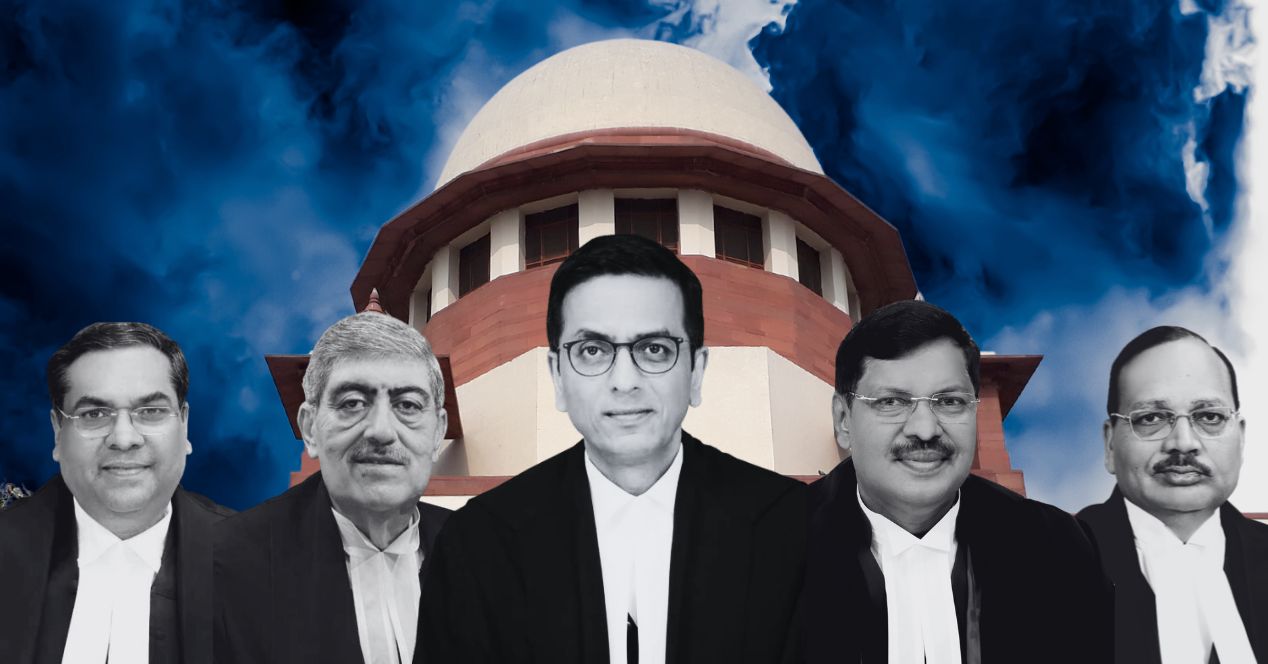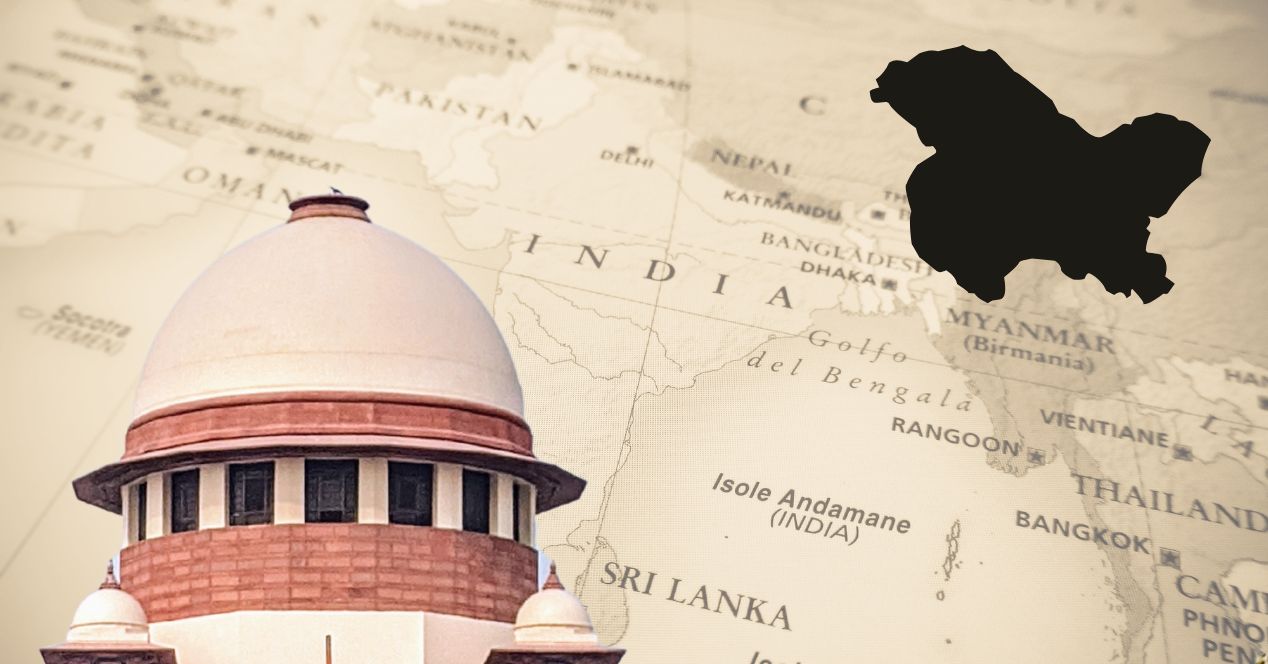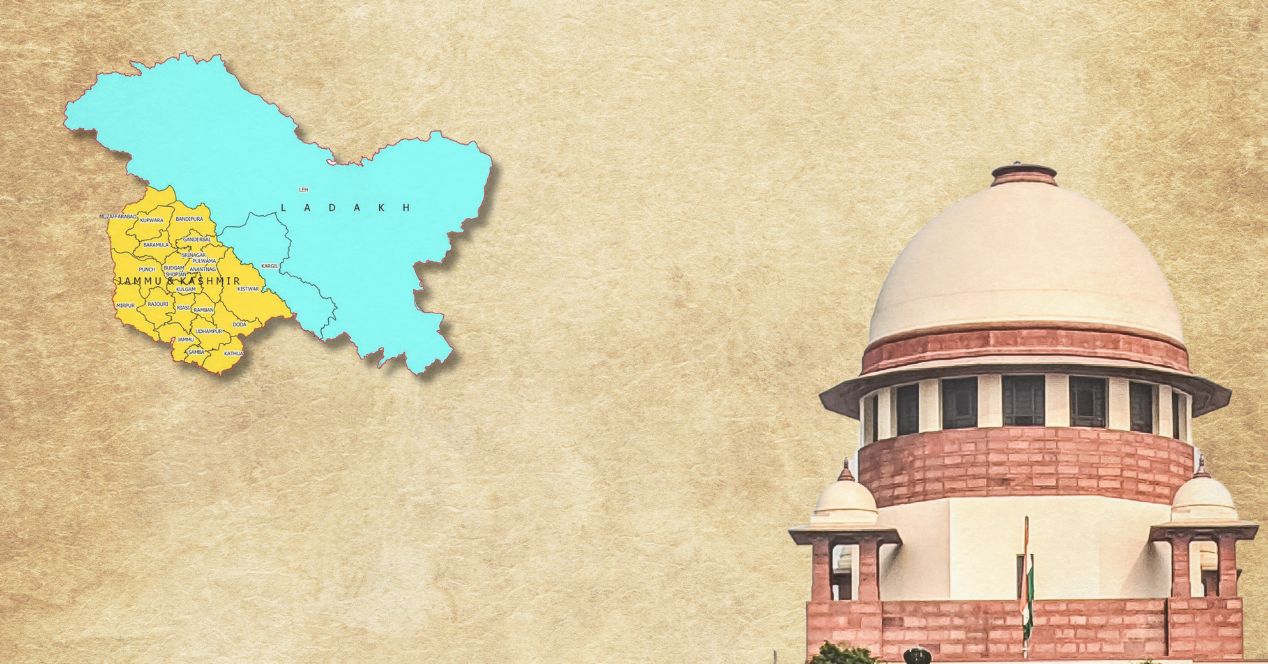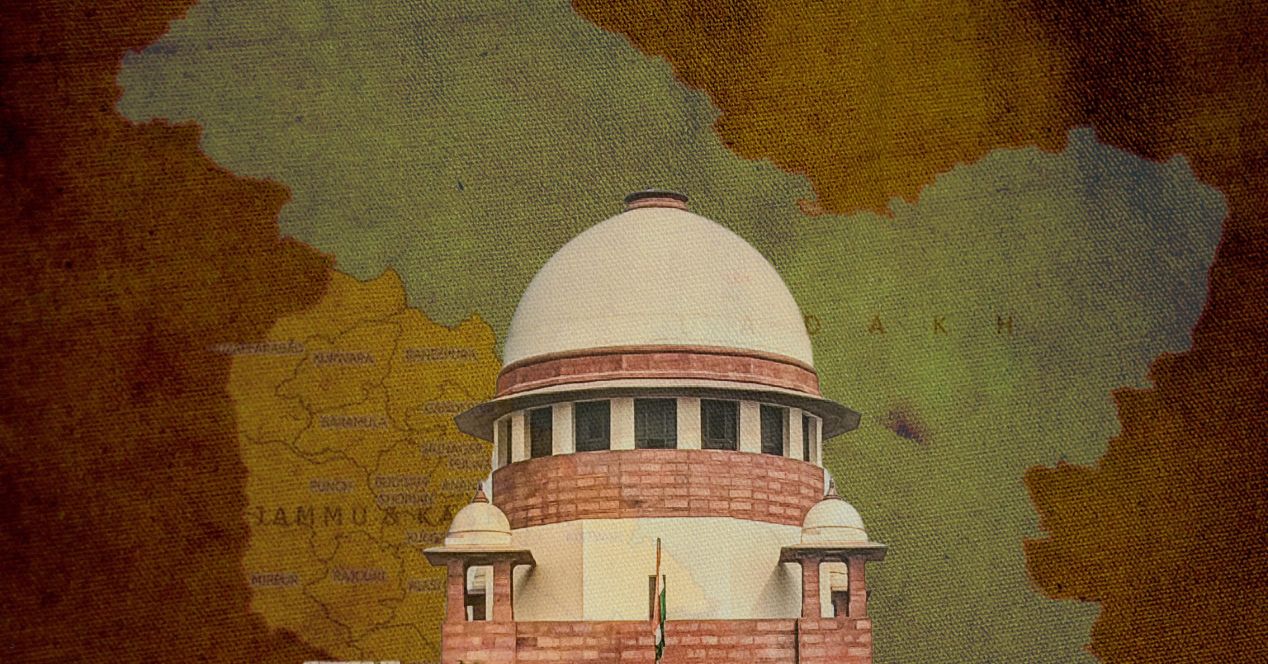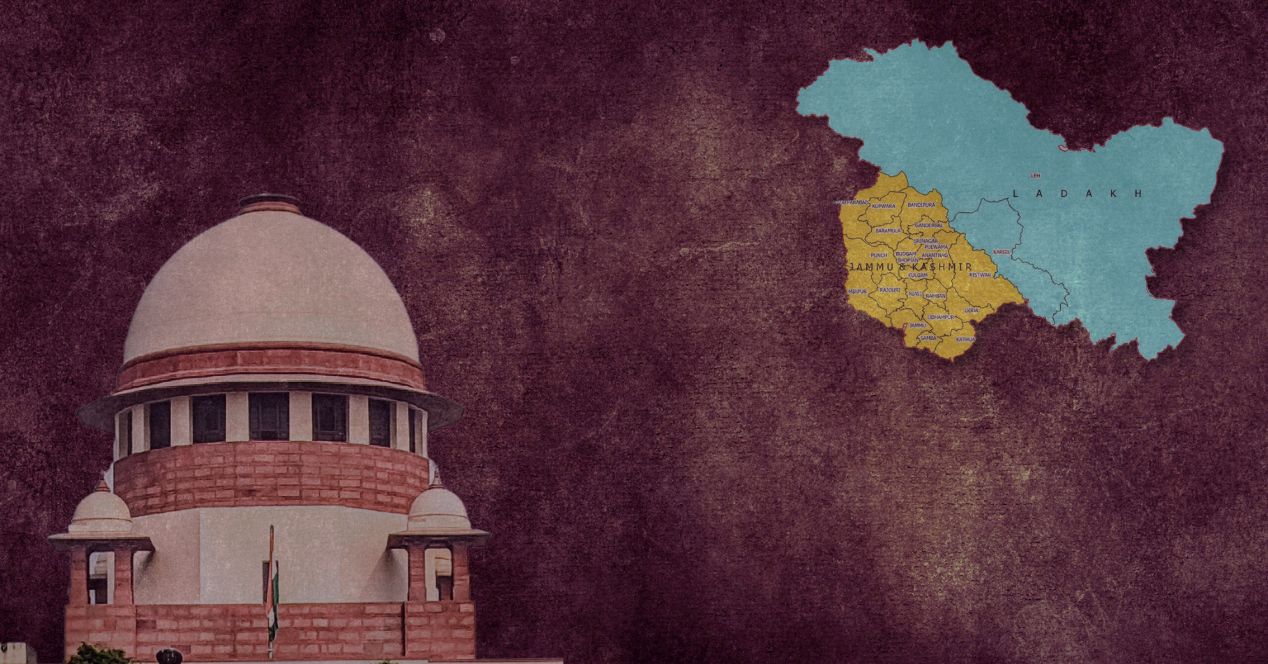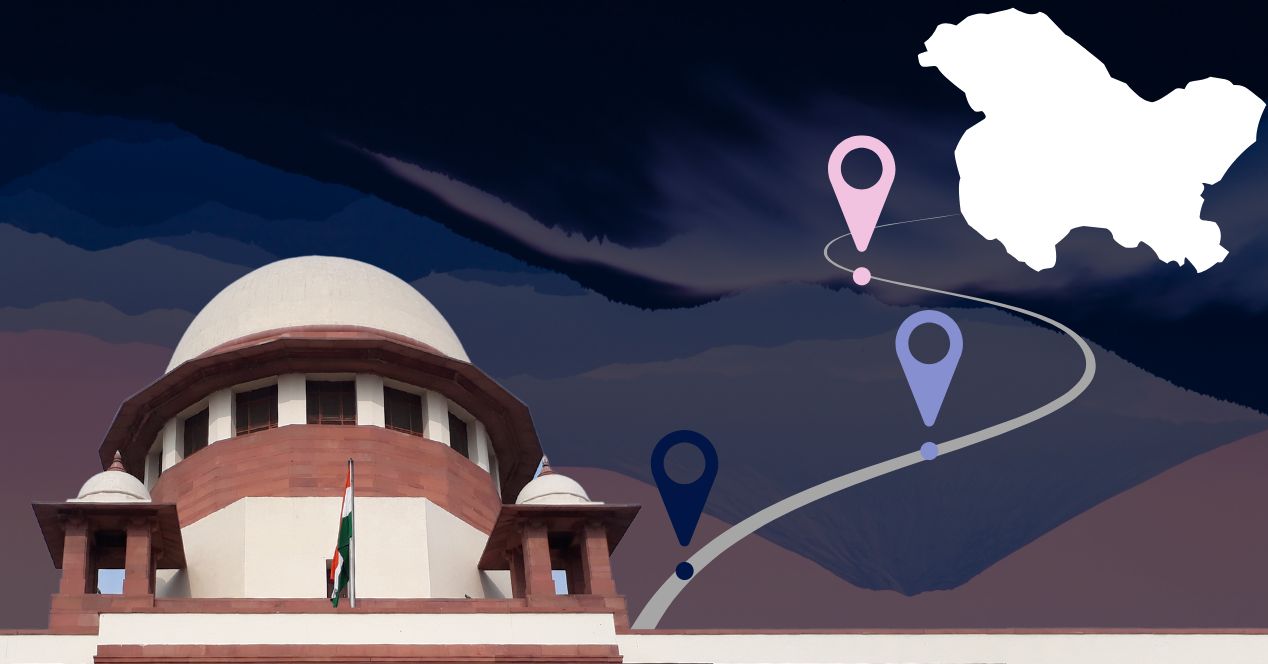Abrogation of Article 370 | Day 7: Reorganisation of J&K into Union Territories is contrary to federalism, argue Petitioners
Challenge to the Abrogation of Article 370Judges: D.Y. Chandrachud CJI, S.K. Kaul J, Sanjiv Khanna CJI, B.R. Gavai J, Surya Kant J
Today, the Bench heard arguments from Senior Advocates Dushyant Dave, Shekhar Naphade and Dinesh Dwivedi.
Dave argued that the President’s Rule could not be used to reorganise J&K under Article 3 and also submitted that the Bharatiya Janata Party’s 2019 election manifesto’s promise to abrogate Article 370 was unconstitutional.
Naphade highlighted that no provision of India’s Constitution expressly gave the Union the power to abolish J&K’s Constitution and also shed light on the practical consequences of the abrogation.
Dwivedi suggested that by reorganising the state into two Union Territories, the Union breached the principle of ‘dual polity’ and federalism enshrined in the Constitution.
Background
Article 370 of the Constitution of India provided the State of Jammu and Kashmir with a special constitutional status. The provision substantially limited Parliament’s power to legislate for the State compared to other states.
On August 5, 2019, the Union government diluted Article 370, revoking Jammu and Kashmir’s special status. First, President Ram Nath Kovind issued presidential order CO 272. This Order allowed the Union to amend Article 370 without the recommendation of the Constituent Assembly.
Since J&K was under President’s Rule at the time, the powers of the Jammu and Kashmir Legislative Assembly were vested in the Union Parliament. So, a few hours after CO 272 was issued, the Rajya Sabha recommended the abrogation of Article 370 through a Statutory Resolution under Article 370(3).
On August 6, 2019, President Kovind issued a Proclamation, CO 273, putting the Rajya Sabha’s recommendation into effect. All clauses of Article 370 ceased to operate, except Clause 1 which was amended to state that the Constitution of India applies wholly to the State, removing the special status awarded to Jammu and Kashmir.
On August 9, Parliament passed the Jammu and Kashmir Reorganisation Act, 2019. This Act bifurcated the State of Jammu and Kashmir into two Union Territories—J&K and Ladakh.
Petitions were filed challenging the constitutionality of the dilution of Article 370 and the bifurcation of the State into two Union Territories.
On August 28, 2019, a 3-Judge Bench led by former CJI Rajan Gogoi referred the case to a 5-Judge Constitution Bench.
On October 1, 2019, 5-Judge Constitution Bench of the Court comprising Justice N.V. Ramana, S.K. Kaul, R. Subhash Reddy, B.R. Gavai and Surya Kant decided to hear the case from November 14th, 2013. The petitioners sought the case to be placed before a larger Bench. On March 2nd, 2020, the Bench refused to refer it to a larger Bench.
On July 3, 2023, the Supreme Court listed the matter to a Constitution Bench led by Chief Justice D.Y. Chandrachud. The Bench assembled on July 11, 2023 and decided to hear the challenge from August 2, 2023.
Dave: Reorganisation and abrogation beyond the scope of the Constitution
Continuing the arguments made on previous hearing days, Dave contended that President’s Rule cannot be used to reorganise states under Article 3. He relied on In Re: The Berubari Union (1960), where the Supreme Court had held that “the treaty-making power would have to be exercised in the manner contemplated by the Constitution and subject to the limitations imposed by it.”
Dave argued that the treaty (the agreement between J&K and India) should be subject to the limitations agreed upon by the Maharaja and India. Using President’s Rule to do away with the stipulations under Article 3, Dave said, was a mockery of constitutional safeguards.
The limitation agreed upon was that the J&K Constituent Assembly would be the appropriate authority to recommend abrogation of Article 370. Dave submitted that when that assembly dissolved in 1957 without repealing Article 370, any opportunity to remove the provision was lost—both to the Union of India and to J&K. The work of the Constituent Assembly was a one time exercise that cannot be repeated over and over again.
Dave then asserted that Articles 370(2) and 370(3) had already served their purpose—the Constituent Assembly of J&K had created a legal document for its state, and had chosen to retain Article 370. He stated that the framers of the Indian Constitution called Article 370 a ‘temporary provision’ as they were referring to the temporary possibility that the Constituent Assembly may remove it.
At this point, Chief Justice Chandrachud interjected. ”If your argument is right,” he asked, “where is the power to alter the Constitution at all?” CJI Chandrachud’s concern here was that if Article 370, because of clauses (2) and (3), is considered to have achieved its life, then no amendments or alterations can be made to the Constitution of India with respect to J&K. Dave attempted to explain that not all provisions of Article 370 were lost. Clause 1 of the Article, which allows Parliament to make laws with the concurrence or consultation of the state, remained.
CJI Chandrachud stated that the Constitution cannot be read inconsistently. Without a constitutional amendment to remove the inoperative clauses, the Court must interpret either all clauses to have survived or for all clauses to have perished. Faced with this line of reasoning, Dave said that all clauses may perish. An incredulous Chief Justice exclaimed, “We’re talking about a practice of over 64 years!” The consequence of interpreting Article 370 as having served its purpose in 1957 would be to contradict the constitutional practice of introducing Presidential Orders for J&K. It would also contradict the agreement between J&K and India.
Trying to assuage the Bench, Dave explained that his only concern was with “process.” Had Article 370 been removed through a constitutional amendment, he suggested, it may have been valid.
Dave: Bharatiya Janata Party’s 2019 Election Manifesto Made Unconstitutional Promises
Towards the end of his submission, Dave pulled out a fresh argument. He drew the Court’s attention to the BJP’s 2019 election manifesto. The party’s promise of the abrogation of Article 370 was contrary to constitutional values, he argued. He also drew attention to the fact that the Supreme Court had also directed the Election Commission to frame guidelines to ensure that manifestos were constitutional.
Naphade: No interpretation of the Indian Constitution can contradict the J&K Constitution
In the second half of the day’s hearings, Naphade argued any interpretation of Article 370(1)(d) had to be made keeping the core of the J&K Constitution intact. This included Part 2 which dealt with the State’s relationship with India and the territory of J&K; and Parts 5 and Part 6 which set out the powers of the state’s executive and legislature. He argued that there is no express provision in the Indian Constitution which awards the power to the Union to override the J&K Constitution.
Using President’s Rule to override the state’s autonomy in 2018, Naphade said, was unconstitutional and betrayed the Union’s ulterior motive. President’s rule is invoked when there is a breakdown of Constitutional machinery. Any action taken in this temporary period must be to ensure that the State as a constitutional entity survives. Splitting J&K and reducing it to a Union Territory was not in line with this goal.
Naphade: Reorganisation of J&K unconstitutional, state left with no representation
The bifurcation of J&K into the Union Territories of J&K and Ladakh violated the idea of a “Union of States” envisaged in Article 1, Naphade contended. He argued that there was a specific reason that Article 3 did not provide for the abolition of states. The existence of a state was part of the basic structure of the Constitution. J&K could not be considered an exception to this idea, and be stripped of its autonomy and identity as a state.
Now, four years after the reorganisation, the Union Territories of J&K and Ladakh are starved for representation in the Indian democratic set up. The practical consequences were manyfold: first, Ladakh has no representatives in the Rajya Sabha; second, J&K does not have proportional representation in the Lok Sabha; third, the territories cannot participate in presidential elections; fourth, they can’t send ministers to Services Tax (GST) Council; fifth, the lack of a governor means that the territories will not be consulted for the Appointment of High Court judges. He stated that by a “very small act”, that is, the Presidential Order CO 272, the whole constitutional fabric of J&K was restructured.
Dwivedi: Reorganisation of J&K as a Union Territory breaches the principle of “Dual Polity”
In his brief submission at the end of the day, Dinesh Dwivedi claimed that though Union Territories were part of India, they were not part of its federal structure. A federal structure, Dwivedi argued, establishes a system of ‘dual polity’ where the local government is responsible for local issues and the Union government for national issues. However, this was not the case for Union Territories as they are governed by the Union. So, states and Union Territories had a different constitutional status.
In this context, Dwivedi submitted that J&K was undoubtedly a part of India’s federal structure as it had “elevated levels” of autonomy. By reducing the state to two Union Territories, the Union breached the federal structure and ‘dual polity.’ It took the rights conferred to the people of the state and converted it into a ‘unitary polity’.
Dwivedi: Accession does not amount to surrender of sovereignty
On Day 5 of the hearings, the Chief had remarked that after the Instrument of Accession was signed by the Maharaja, the transfer of J&K’s sovereignty to India was “absolute.”
Dwivedi responded to this today. He argued that unlike other states, J&K had not signed a “merger” or “standstill” agreement with India to transfer internal governance of the state to the Indian Union. Therefore, its accession did not transfer sovereignty and autonomy to India. The residuary powers were retained with the state and India had no right to “breach this sovereignty”.
Dwivedi and other counsels for the petitioners will conclude their arguments on Tuesday, August 22, 2023.

